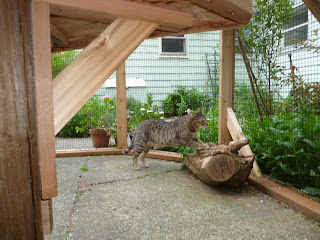You may have seen cat behaviorist Mieshelle Nagelschneider on television or in popular magazines. I love that cats are finally getting mainstream airtime and enjoyed Jackson Galaxy's book last year, so I recently checked out Nagelschneider's new book "The Cat Whisperer." Unlike Galaxy's memoir, there are no gritty details of drug addiction and the difficulties of holding down jobs and making rent. Whereas Galaxy seems to have a spiritual and deeply empathic connection to felines, Nagelschneider bases all of her findings on science and her rigorous training. If you are new to being a kitty parent or simply want a broader understanding of cat behavior norms, I'd recommend "The Cat Whisperer." Keep in mind that like me, you may be live with a delightfully "different" kitty or two who defy "normal."
Nagelschneider makes great suggestions for setting up your home to maximize feline satisfaction and enrichment, especially if you have multiple cats. Placing tall kitty condos in areas that offer some views, not in windowless corners; offering water in areas away from food (such as the bathroom) since most cats like to drink separate from eating; and maintaining scrupulously clean litter boxes in a variety of spots in the home rather than all in one place are all ideas I encourage as well. She illustrates her points with real life cases and speaks out against declawing with a sad tale from her days as a vet tech. I do however strongly disagree with her suggestion that free feeding is optimal in a multi-cat home because it discourages competition for food. She claims that most cats won't overeat to the point that they become overweight yet in the U.S. 55% of domestic cats ARE overweight and from my experience free feeding dry food because it's convenient and less messy than canned or raw is to blame. Nagelschneider doesn't discuss diet much or point out that changing to a whole foods (usually raw and/ or homemade) diet can make a huge difference in a cat's behavior. I think maintaining a twice a day feeding schedule lets you cat feel secure that he won't get too hungry while allowing time for proper digestion. If you snack all day how can you ever work up an appetite for a healthy meal? Of course senior cats often need small, frequent meals with lots of moisture content. A section, or perhaps an entire second book, on senior kitties would be wonderful since our companions are living longer than ever before.
Nagelschneider discusses clicker training, which I have yet to try but live with two kitties who would be excellent candidates. I can't see how it could work if a cat wasn't food motivated and in my experience probably less than half the kitties I meet are. I've included a link to a Best Friends video on clicker training. Raed is the furry white and black kitty pictured and one of my favorite felines to follow on their blog! As adorable as he is, Raed has had some trouble getting adopted into a permanent home because he dislikes other cats and tends to get overstimulated and swats at people. Clicker training has channeled some of this energy into a positive outlet.
http://www.youtube.com/watch?v=X_gaxjzYONw
Having you kitty checked out medically is naturally always the first course of action if he or she starts missing the litter box or yowling all night. Again, advancing age accounts for cognitive decline that makes cats confused, and often harder stool and stiffness in the spine and back legs make using the litter box more challenging. Talking to an animal communicator if the vet gives your kitty an all clear may prove insightful. Utilizing alternative wellness techniques such as acupuncture and supplements may also make a difference over time. Just like the film "Best in Show" comically illustrates, your stress level contributes to your companion animal's stress level. Spending time playing, cuddling and napping with your kitty is a good de-stresser for everyone. My take-away regarding "The Cat Whisperer" is that there are lots of good techniques to try if your kitties have some bothersome habits, but keep your expectations under control and remember that your kitty might just be "special." Reframing his habits as endearing and unique to him might be more helpful in the long run, just like you do with the humans in your life. "Cats have taught me much... I really don't think I could ever be completely happy without having them around me. They have always been my truest friends," comments Nagelschneider in the afterword and I totally agree.










